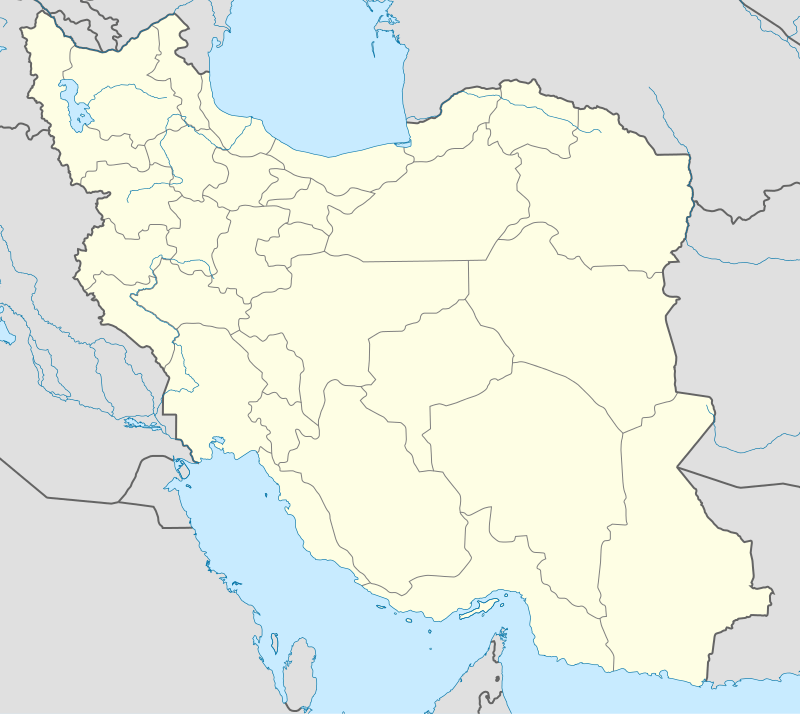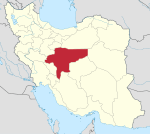Golpayegan
| Golpayegan Golpāyegān | |
|---|---|
| city | |
 Golpayegan | |
| Coordinates: 33°27′13″N 50°17′18″E / 33.45361°N 50.28833°ECoordinates: 33°27′13″N 50°17′18″E / 33.45361°N 50.28833°E | |
| Country |
|
| Province | Isfahan |
| County | Golpayegan |
| Bakhsh | Central |
| Elevation | 1,830 m (6,000 ft) |
| Population (2006) | |
| • Total | 47,849 |
| Time zone | IRST (UTC+3:30) |
| • Summer (DST) | IRDT (UTC+4:30) |
| Area code(s) | 0372 |
| Website | http://www.akhale.ir/ (in Persian:آخاله |
Golpayegan (Persian: Golpāyegān, also Romanized as Golpayegan; also known as Shahr-e Golpāyegān meaning "City of Golpayegan")[1] is a city in and the capital of Golpayegan County, Isfahan Province, Iran. At the 2006 census, its population was 47,849, in 14,263 families.[2] Golpayegan is located 186 kilometres (116 mi) northwest of Isfahan and 102 kilometres (63 mi) southeast of Arak, situated at an altitude of 1,830 m. Its temperature fluctuates between +37° and -10° Celsius. Its average annual rainfall is 300 mm [3]
Golpayegan, land of tulips.
Historically, the name of the town has been recorded as Vartpadegān,[4](ورت پاتگان) Jorfadeghan,[5] (جرفادقان) Darbayagan, Kuhpayegan,[6](کوه پایگان) and Golbādagān.[7] Golpayegan means fortress of flowers and land of tulips (Persian: سرزمین گلهای سرخ Sarzamin-e golha-ye sorkh). According to Ḥamd-Allāh Mostawfi,[8] the town of Golpāyegān was built by the daughter of Bahman,Samra, also known as Homāy Bente Bahman in Persian: همای بنت بهمن
Golpayegan, the city of Artists
Golpayegan has many Artists. Mohammad Karami (painter) is one of them. Mohammad Karami is one of the contemporary painting artists in IRAN. He put and extreme patience and attention to the very beautiful landscapes around and the moments of his life and has drown them incredibly. In one of his works called "after rain in jungle" we can smell the humidity in the air and feel the wet ground. He basically focuses on Oil-painting more, however he has paited Water-color, Black and white-pencil, Color-pencil, Pastel,etc...[9]
Golpayegan is Artist’s city. Mirza Asadolahe Ghodsi, Karbalai Iadolahe Gugadi Tar zan, Hedar Babkhalil" (حیدر بافقلی) (Ostade bihamtaye Zarb), Ahmade Sorur, Mohamad luti (Ostade Sorna), Tahere Safi (khoshnevis), Hamide Marjani (Violinist)
Other Artists:
Ostad Abolghasem Golpayegani, Ostad Habibolahe Iadegari, Ostad Hedare Ghashoghtarash (استاد حیدر قاشق تراش) Mohamad and Ali Mokhtari, Ostad Hedar Niknaam,
Ali Tavasoli, Mohamadreza Tavasoli, Mohamad Bagher Tavasoli, Mohamad Taghi Tavasoli, Mohamad Ebrahim Tavasoli, Mohamd Bagher Masah, Gholamreza Ghadiri, Gholamreza Ghanbari, Hassan Bakhshi, Rajabalie Ghanad, Mohamadreza Safi….are wood-carving, expert.
Andalibe Tavalai, Hasane Barazanda, Mostafa Mansuri, Ehsane Jamali, Mariam Javanbakht, …etc...
Ahmad soltani(mashhor be amo ali akbar)
Historical monuments
Several historical monuments are located in Golpayegan: Jameh mosque of Golpayegan, a minaret (Manar) from the Seljuk period, the Sarāvar mosque from the 9th-10th/15th-16th centuries; Hevdah Tan (هفده تن) shrine from the 11th/17th century.[10] Bab shekj (Dare Shahidan), Gugad,s Arg, the shrine of Emāmzāda Abu’l-Fotuḥ (in Vaneshun), a descendant of Imam Musā al-Kāẓem from the 10th/16th century; the shrine of Emāmzāda Sayyed Sādāt from the 8th/14th century….Ghale Vedagh, etc.
References
- ↑ Golpayegan can be found at GEOnet Names Server, at this link, by opening the Advanced Search box, entering "-3064684" in the "Unique Feature Id" form, and clicking on "Search Database".
- ↑ "Census of the Islamic Republic of Iran, 1385 (2006)". Islamic Republic of Iran. Archived from the original (Excel) on 2011-11-11.
- ↑ (Wezārat-e defāʿ, pp. 218-19; Wezārat-e rāh wa tarābari, pp. 119-20).
- ↑ (Eṣṭaḵri, p. 198, n. c);
- ↑ Moqaddasi, p. 402;
- ↑ (Abu’l-Fedā, Taqwim, p. 419;
- ↑ (Nozhat al-qolub, ed. Le Strange, p. 68).
- ↑ (p. 95) and Qāżi Aḥmad Ḡaffāri (p. 30),
- ↑ گذری بر آثار هنری استاد محمّد کرمی
- ↑ (Meškāti, pp. 64-67; Rafiʿi Mehrābādi, pp. 895-96, 898-901).
External links
| Wikimedia Commons has media related to Golpayegan. |
- ' Hamneshine Bahar: Golpayegan (golpayegun) shahre lalehaye vajgun همنشین بهار: گلپایگان (گلپایگون)، شهر لالههای واژگون
- Golpayegan Dam
- Golpayegan Dam . map
- Hamneshine Bahar : Golpayegan (video)
- The News Golpayeganiha
- The News Golpapress
